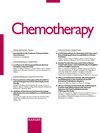副肿瘤脱髓鞘炎性神经病变显示转移性精原细胞瘤:1例报告
IF 2
4区 医学
Q3 ONCOLOGY
引用次数: 0
摘要
副肿瘤神经综合征(PNS)是一种罕见且不为人所知的疾病。PNS可以显示癌症,但其在精原细胞瘤中的作用尚未明确描述。我们报告的情况下,一个36岁的男子没有显著的病史和合并症,谁被诊断为腹膜后转移精原细胞瘤。患者一般情况恶化,并发展为进行性神经性麻痹,无其他临床异常。肌电图显示脱髓鞘,非长时间神经病变。最初怀疑是格林-巴罗综合征。然而,正电子发射断层扫描显示腹膜后肿块,血液标志物显示人绒毛膜促性腺激素升高。患者被诊断为PNS,计算机断层扫描引导活检显示转移性精原细胞瘤,无原发肿瘤。未检测到循环神经抗体。化疗同时给予人多价免疫球蛋白。顺铂-依托泊德-博来霉素三个周期后,观察到完全的生物学和代谢反应率,他的神经症状迅速改善。四年后,患者完全好转,没有任何神经系统疾病。副肿瘤脱髓鞘炎性神经病变可导致晚期精原细胞瘤的诊断。以顺铂为基础的方案及时治疗精原细胞瘤为晚期精原细胞瘤和副肿瘤综合征提供了最好的治愈机会。本文章由计算机程序翻译,如有差异,请以英文原文为准。
Paraneoplastic Demyelinating Inflammatory Neuropathy Revealing Metastatic Seminoma: A Case Report
Paraneoplastic neurological syndrome (PNS) is uncommon and not well known. PNS can reveal cancer, but its role in seminomas has not been described explicitly. We report the case of a 36-year-old man with unremarkable medical history and no comorbidities who was diagnosed with a retroperitoneal metastatic seminoma. The patient’s general condition deteriorated, and he developed progressive neurological palsy without other clinical anomalies. Electromyography revealed demyelinating, non-lengthy neuropathy. Guillain-Barré syndrome was initially suspected. However, a positron emission tomography scan revealed a retroperitoneal mass, and blood markers revealed increased human chorionic gonadotropin. The patient was diagnosed with PNS, and a computed tomography-guided biopsy revealed a metastatic seminoma without a primary tumor. No circulating neural antibodies were detected. Human polyvalent immunoglobulin was simultaneously administered with chemotherapy. After three cycles of a cisplatin-etoposide-bleomycin, a complete biological and metabolic response rate was observed, and his neurological symptoms rapidly improved. Four years later, the patient responded completely, without any neurological complaints. Paraneoplastic demyelinating inflammatory neuropathy can lead to advanced seminoma diagnosis. Prompt management of seminomas with cisplatin-based regimens provides the best chance of cure for both advanced seminoma and paraneoplastic syndrome.
求助全文
通过发布文献求助,成功后即可免费获取论文全文。
去求助
来源期刊

Chemotherapy
医学-药学
CiteScore
5.80
自引率
0.00%
发文量
34
审稿时长
6-12 weeks
期刊介绍:
This journal publishes original research articles and state-of-the-art reviews on all aspects of antimicrobial and antitumor chemotherapy. The results of experimental and clinical investigations into the microbiological and pharmacologic properties of antibacterial, antiviral and antitumor compounds are major topics of publication. Papers selected for the journal offer data concerning the efficacy, toxicology, and interactions of new drugs in single or combined applications. Studies designed to determine the pharmacokinetic and pharmacodynamics properties of similar preparations and comparing their efficacy are also included. Special emphasis is given to the development of drug-resistance, an increasing problem worldwide.
 求助内容:
求助内容: 应助结果提醒方式:
应助结果提醒方式:


